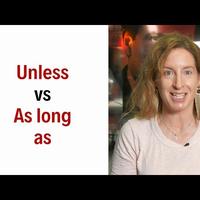'Unless' vs 'As long as': What's the difference? English In A Minute
Если не|||||Какова|разница|разница|Английский|В|Один|Минуту
À moins que|||||||||||
|versus||||o que é|o|diferença|inglês|em|um|minuto
Olmadıkça|||||Ne|belirsiz artikel|fark||||
Es sei denn|||||Was|der|Unterschied||||
~하지 않는 한|||||무엇이|그|차이||안|하나|분
〜しない限り|||||||||||
Es sei denn" vs. "Solange": Was ist der Unterschied? Englisch in einer Minute
A menos que" frente a "siempre que": ¿Cuál es la diferencia? Inglés en un minuto
Sauf" ou "Tant que" : Quelle est la différence ? L'anglais en une minute
"A meno che" e "Finché": Qual è la differenza? Inglese in un minuto
'unless'対'As long as':その違いは?分でわかる英語
'Unless' 대 'As long as': 차이점은 무엇인가요? 1분 안에 끝내는 영어
"Chyba że" vs "Dopóki": Jaka jest różnica? Angielski w minutę
"Unless" (a menos que) vs "As long as" (desde que): Qual é a diferença? Inglês num minuto
'Unless' vs 'As long as': В чем разница? Английский за минуту
'Sürece' ile 'Olduğu sürece': Aralarındaki fark nedir? Bir Dakikada İngilizce
"Якщо" vs "Поки": У чому різниця? Англійська за хвилину
'Trừ khi' và 'Miễn là': Sự khác biệt là gì? Tiếng Anh Trong Một Phút
除非 "与 "只要":有什么区别?英语一分钟
「除非」與「只要」:有什麼區別?一分鐘英語
Hi, I'm Georgina from BBC Learning English.
Привет|Я|Джорджина|из|BBC|Обучение|Английский
Salut|je suis|Georgina|de|BBC|Apprentissage|Anglais
oi|eu sou|Georgina|da|BBC|Aprendizado|Inglês
Merhaba|Ben|Georgina|-den|BBC|Öğrenme|İngilizce
Hallo|ich bin|Georgina|von|BBC|Lernen|Englisch
안녕하세요|저는|조지나|출신입니다|BBC|학습|영어
こんにちは|私は|ジョージーナ|の|BBC|学習|英語
hola|soy|Georgina|de|BBC|aprendizaje|inglés
In today's lesson, we look at the difference between
В|сегодняшнем|уроке|мы|рассматриваем|на|разницу|разницу|между
Dans|d'aujourd'hui|leçon|nous|regardons|à|la|différence|entre
em|de hoje|lição|nós|olhamos|para|a|diferença|entre
Bugünkü|bugünkü|ders|biz|bakıyoruz|-e|(belirtili artikel)|fark|arasında
In|heutigen|Unterricht|wir|schauen|auf|den|Unterschied|zwischen
오늘의|수업|수업|우리는|살펴봅니다|에|그|차이|사이에
今日の|レッスン|レッスン|私たち|見る|に|その|違い|の間
en|la de hoy|lección|nosotros|miramos|a|la|diferencia|entre
在今天的课程中,我们来看看两者之间的区别
'unless' and 'as long as'.
если не||||
à moins que||||
a menos que|e|como|longo|como
olmadıkça||||
es sei denn||||
~하지 않는 한||||
〜しない限り||||
'a menos que' y 'mientras que'.
'unless' ve 'as long as'.
“除非”和“只要”。
Unless and 'as long as' can be used to replace 'if'
Если не|||||могут|быть|использованы|для|заменить|если
À moins que|||||peuvent|être|utilisés|à|remplacer|si
a menos que|e||||pode|ser|usado|para|substituir|
Olmadıkça|||||-abilir|||||eğer
Es sei denn|||||können|||||wenn
만약 ~하지 않으면||||||||||만약
もし~でなければ||||||||||もし
a menos que|y|como|largo|como|puede|ser|usarse|para|reemplazar|si
A menos que y 'mientras que' se pueden usar para reemplazar 'si'
Trừ khi và 'miễn là' có thể được sử dụng để thay thế 'nếu'
除非和“只要”可以用来代替“如果”
in different situations.
в|разных|ситуациях
dans|différentes|situations
in|verschiedenen|Situationen
en|diferentes|situaciones
em|diferentes|situações
en diferentes situaciones.
farklı durumlarda.
在不同的情況下。
Let's have a look at some example sentences:
Давайте|посмотрим|на|взгляд|на|некоторые|примеры|предложения
Regardons|avoir|un|regard|à|quelques|exemple|phrases
vamos|ter|uma|olhar|em|algumas|exemplo|frases
Hadi|sahip olalım|bir|bakış|üzerine|bazı|örnek|cümleler
Lass uns|haben|ein|Blick|auf|einige|Beispiel|Sätze
우리|가지자|하나|보자|에|몇몇|예시|문장들
しよう|持つ|一つ|見る|に|いくつかの|例の|文
vamos a|tener|un|vistazo|a|algunos|ejemplos|oraciones
Давайте посмотрим на некоторые примерные предложения:
Bazı örnek cümlelere bir göz atalım:
Chúng ta hãy xem một số câu ví dụ:
让我们看一些例句:
I will go to the party if you come too.
Я|буду|идти|на|вечеринку|вечеринка|если|ты|придешь|тоже
Je|(verbe auxiliaire futur)|irai|à|la|fête|si|tu|viens|aussi
eu|(verbo auxiliar futuro)|irei|para|a|festa|se|você|vier|também
Ben|-eceğim|gitmek|-e|-i|parti|eğer|sen|gelmek|de
Ich|werde|gehen|zur|der|Party|wenn|du|kommst|auch
나는|(미래 시제 조동사)|갈|에|그|파티|만약|너|오면|또한
私|(未来形の助動詞)|行く|に|その|パーティー|もし|あなた|来る|も
yo|(verbo auxiliar futuro)|iré|a|la|fiesta|si|tú|vienes|también
Iré a la fiesta si tú también vienes.
Я пойду на вечеринку, если ты тоже придешь.
Sen de gelirsen partiye gideceğim.
Tôi sẽ đi dự tiệc nếu bạn cũng đến.
如果你也来的话我也会去参加聚会。
如果你也来,我就会去参加派对。
I will go to the party as long as you come too.
Я|буду|идти|на|вечеринку|вечеринка|пока|долго|как|ты|придешь|тоже
Je|(verbe auxiliaire futur)|irai|à|la|fête|tant que|longtemps|que|tu|viennes|aussi
eu|(verbo auxiliar futuro)|irei|para|a|festa||||você|venha|também
Ben|||-e|(belirsiz artikel)|parti||||sen|gelirsin|de
Ich|werde|gehen|zur|der|Party|solange|lange|wie|du|kommst|auch
나는|(미래 시제 조동사)|간다|에|그|파티|~하는 한|오랫동안|~하는 한|너|온다|또한
私|(未来形の助動詞)|行く|に|その|パーティー|〜する限り|長い|〜する限り|あなた|来る|も
yo|(verbo auxiliar futuro)|iré|a|la|fiesta|siempre que|largo|que|tú|vengas|también
Ich werde zur Party gehen, solange du auch kommst.
Iré a la fiesta siempre que tú también vengas.
Я пойду на вечеринку, при условии что ты тоже придешь.
Sen de geldiğin sürece partiye gideceğim.
Tôi sẽ đi dự tiệc miễn là bạn cũng đến.
只要你也来我就去参加聚会。
只要你也来,我就会去参加派对。
Both of these sentences have the same meaning.
Оба|из|эти|предложения|имеют|тот же|одинаковый|смысл
Les deux|de|ces|phrases|ont|le|même|sens
ambos|de|estas|frases|têm|o|mesmo|significado
Her iki|-nin|bu|cümleler|var|aynı|aynı|anlam
Beide|von|diese|Sätze|haben|die|gleiche|Bedeutung
두 개의|의|이|문장들|가지고 있다|같은|같은|의미
両方|の|これらの|文|持っている|同じ|同じ|意味
ambas|de|estas|oraciones|tienen|el|mismo|significado
Beide dieser Sätze haben die gleiche Bedeutung.
Ambas oraciones tienen el mismo significado.
Cả hai câu này đều có cùng một nghĩa.
这两个句子的意思是一样的。
Notice that the verb after 'if' and 'as long as' is positive.
Обратите внимание|что|глагол||после|если|и||||является|положительным
Remarquez|que|le|verbe|après|si|et||||est|positif
note|que|o|verbo|depois de|se|e||||é|positivo
Dikkat et|ki|o|fiil|sonra|eğer|ve||||dir|olumlu
Beachte|dass|das|Verb|nach|wenn|und||||ist|positiv
주목하세요|~라는 것을|그|동사|~후에|만약|그리고||||~이다|긍정적인
注意してください|その|その|動詞|の後|もし|と||||は|肯定的
nota|que|el|verbo|después de|si|y|tan|largo|como|está|positivo
Beachten Sie, dass das Verb nach 'if' und 'as long as' positiv ist.
Observa que el verbo después de 'si' y 'mientras' es positivo.
'If' ve 'as long as' ifadelerinden sonra gelen fiilin olumlu olduğuna dikkat edin.
Lưu ý rằng động từ sau 'if' và 'as long as' là động từ khẳng định.
请注意,“if”和“as long as”后面的动词是肯定的。
请注意在'如果'和'只要'之后的动词是肯定的。
Now look at these sentences:
Теперь|посмотри|на|эти|предложения
Maintenant|regarde|à|ces|phrases
agora|olhe|para|estas|frases
Şimdi|bak|-e|bu|cümleler
Jetzt|schau|auf|diese|Sätze
이제|보세요|에|이|문장들
今|見て|に|これらの|文
ahora|mira|a|estas|oraciones
Ahora mira estas oraciones:
现在看看这些句子:
If you don't do your homework, you can't watch the film.
Если|ты|не|сделаешь|твое|домашнее задание|ты|не сможешь|смотреть|этот|фильм
Si|tu|ne|fais|ton|devoir|tu|ne peux|regarder|le|film
se|você|não|fizer|sua|lição de casa|você|não pode|assistir|o|filme
Eğer|sen|yapmazsan|ödevini|senin|ödevini|sen|izleyemezsin|izlemek|o|film
Wenn|du|nicht|machst|deine|Hausaufgaben|du|kannst nicht|sehen|den|Film
만약|너|하지 않으면|숙제를|너의|숙제|너|못해|보다|그|영화
もし|あなた|しない|宿題|あなたの|宿題|あなた|できない|見る|その|映画
si|tú|no|haces|tu|tarea|tú|no puedes|ver|la|película
Wenn du deine Hausaufgaben nicht machst, darfst du den Film nicht sehen.
Si no haces tu tarea, no puedes ver la película.
Если вы не сделаете домашнее задание, вы не сможете смотреть фильм.
Nếu bạn không làm bài tập về nhà, bạn không thể xem phim.
如果你不做作业,你就不能看电影。
Unless you do your homework, you can't watch the film.
Если не|ты|сделаешь|твою|домашнюю работу|ты|не можешь|смотреть|этот|фильм
À moins que|tu|fasses|ton|devoir|tu|ne peux pas|regarder|le|film
a menos que|você|faça|sua|lição de casa|você|não pode|assistir|o|filme
-mezsen|sen|yaparsan|senin|ödevini|sen|-emezsin|izlemek|o|film
Es sei denn|du|machst|deine|Hausaufgaben|du|kannst nicht|sehen|den|Film
네가 하지 않으면|너|숙제를|너의|숙제|너|못해|보다|그|영화
もし|あなた|する|あなたの|宿題|あなた|できない|見る|その|映画
a menos que|tú|hagas|tu|tarea|tú|no puedes|ver|la|película
Wenn du deine Hausaufgaben nicht machst, kannst du den Film nicht sehen.
A menos que hagas tu tarea, no puedes ver la película.
Пока вы не сделаете домашнее задание, вы не сможете смотреть фильм.
Ev ödevinizi yapmadığınız sürece filmi izleyemezsiniz.
Trừ khi bạn làm bài tập về nhà, bạn không thể xem phim.
除非你做作业,否则你不能看这部电影。
除非你做作业,否则你不能看电影。
Both of these sentences have the same meaning.
Оба|из|эти|предложения|имеют|тот же|одинаковый|смысл
Les deux|de|ces|phrases|ont|le|même|sens
ambos|de|estas|frases|têm|o|mesmo|significado
Her iki|-nin|bu|cümleler|var|aynı|aynı|anlam
Beide|von|diese|Sätze|haben|die|dieselbe|Bedeutung
두 개의|의|이|문장들|가지고 있다|같은|같은|의미
両方|の|これらの|文|持っている|同じ|同じ|意味
ambas|de|estas|oraciones|tienen|el|mismo|significado
Beide Sätze haben die gleiche Bedeutung.
Ambas oraciones tienen el mismo significado.
这两句话的意思是一样的。
But notice that the verb after 'if' is negative
Но|обратите внимание|что|(артикль)|глагол|после|если|(глагол-связка)|отрицательный
Mais|remarque|que|le|verbe|après|si|est|négatif
mas|note|que|o|verbo|depois de||é|negativo
Ama|dikkat et|ki|(belirli artikel)|fiil|sonra|eğer|(dır)|olumsuz
Aber|beachte|dass|das|Verb|nach|wenn|ist|negativ
하지만|주목하다|~라는 것|그|동사|~후에|만약|이다|부정적인
しかし|気づいてください|その|その|動詞|の後|もし|は|否定形
pero|nota|que|el|verbo|después de||está|negativo
Pero nota que el verbo después de 'si' es negativo.
但请注意“if”后面的动词是否定的
但请注意,'如果'后面的动词是负面的。
and the verb after 'unless' is positive.
и|глагол|глагол|после|если не|является|положительным
et|le|verbe|après|à moins que|soit|positif
e|o|verbo|depois de|a menos que|é|positivo
ve|belirsiz artikel|fiil|sonra|-mezse|olumlu|
und|das|Verb|nach|es sei denn|ist|positiv
그리고|그|동사|뒤에|~하지 않는 한|이다|긍정적인
そして|その|動詞|の後|〜しない限り|は|肯定的
y|el|verbo|después de||está|positivo
und das Verb nach "es sei denn" ist positiv.
そして'unless'の後の動詞は肯定的である。
và động từ sau 'trừ khi' là khẳng định.
Bye!
adiós
tchau

